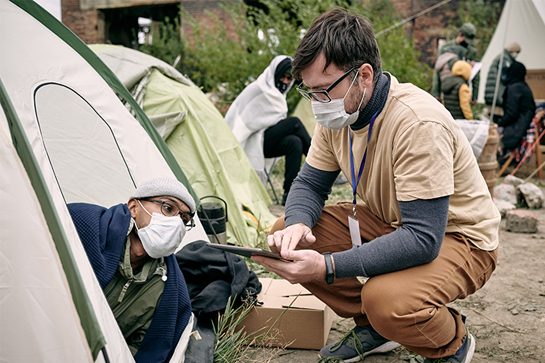According to The UN Refugee Agency, also known as UNHCR, over 68 million people worldwide have been forcibly displaced from their homes. The majority of these individuals, around 40 million, are still residing within the borders of their own countries and are known as internally displaced persons, or IDP. The remaining 28 million people who have not only fled their homes but have also fled their native countries are classified in one of two categories, refugees or asylum seekers. While these terms are often confused or used interchangeably, they are actually two different officially recognized statuses with their own important distinctions.
What Is the Difference?
Less than a decade after World War II created one of the largest mass migrations in history, 145 countries signed a document known as the 1951 Refugee Convention. This treaty provides very specific guidelines for what it means to qualify as a refugee, as well as outlining the rights of recognized refugees and the obligations of their host countries. According to international law, the difference between an asylum seeker and a refugee has to do with what step they are at in a defined process. Simply put, an asylum seeker is someone who has fled their home country, has applied for protection under the 1951 Refugee Convention, and is now awaiting the review of their claims that they have been persecuted and are unable to return home safely. While a refugee is someone who has already completed that process and has had their asylum request approved. This difference may seem arbitrary, but it actually has a profound impact on individuals settling in the United States.
Individuals entering the United States as refugees have previously fled their home country and then applied for and were granted UN recognition as refugees while living somewhere other than the United States. According to UNHCR, there are roughly 28 million refugees living in various part of the world but only about 1% will be considered for permanent resettlement in another country; the rest will either return home once it is safe or will stay indefinitely in their original asylum country. The resettlement process varies from country to country, but for refugees coming to the United States they must be referred by the UNHCR and then undergo a process of screening that includes interviews and security checks with multiple agencies. The entire process usually takes around two years before a refugee is cleared for resettlement. Once they do arrive in the United States they are formally resettled through the Office of Refugee Resettlement and their partner organizations which help provide refugees with the resources that they need to land on their feet. Resettled refugees are also given immediate work permits as part of their goal to quickly achieve self sufficiency.
An asylum seeker is an individual who has fled their home country and then applied for asylum once they have arrived in the United States. A formal request for asylum prevents an individual from being immediately deported, but they must go through a legal process to prove their need for asylum before they are granted permission to stay in the country permanently. This process includes interviews and hearings and may take anywhere from weeks to years before a final decision is made. During the ongoing legal process, an asylum seeker is in a state of legal limbo that makes accessing many resources difficult and often prevents individuals from working legally. If a request for asylum is approved, the individual becomes known as an asylee and is granted permission to stay in the country, work legally, and after a specific length of time, apply for permanent resident status.
What Do They Have in Common?
Though their path to legal residence is different, asylees and refugees share a lot of common ground. For starters, both face the reality of having been forced to flee their previous lives and start over in an unfamiliar country. Additionally, both often experience the long-term effects of physical and emotional injuries from their previous persecution.
Thankfully, resources are available to help with these challenges. Refugees and many asylees qualify for short term financial assistance and medical coverage through the Office of Refugee Resettlement. There are also organizations that assist with many of the logistical challenges for starting a new life. For example, many faith-based organizations, such as Catholic Community Services or Jewish family Services provide newly arrived refugees with job placement, health services, interpretation, transportation, housing, food assistance, volunteer opportunities and, perhaps most importantly, case management.
Case management is often one of the most critical resources available to resettled refugees because the task of navigating cultural, economic, and legal opportunities and expectations can quickly become unmanageable for a recent arrival. A case manager who has the experience and the tools necessary to help refugees access any necessary resources or available opportunities is an invaluable asset towards helping them build a self-sufficient life.
Eccovia Solutions is proud to partner with states such as Texas and Kentucky on their statewide refugee resettlement databases. By utilizing ClientTrack Case Management, states, counties, and individual agencies are able to quickly enter client information, share data, measure impact, and provide referral services so that refugees can easily access the resources that they need to thrive.



